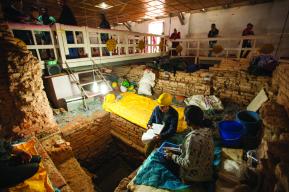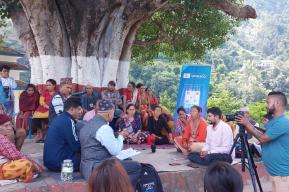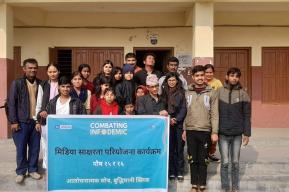Sahani was one of the 20 trainees who participated in the off-seasonal vegetable farming training of constructing plastic tunnels, organized by Kala Community Learning Centre with the support of UNESCO in April 2019. The training provided many theoretical sessions and practical activities on the production, storage, and market management of various types of vegetables.
“Joining the training helped me gain knowledge and increase my income. By applying the technical knowledge gained in the training, I was able to increase production,” he said.
However, vegetable farming was not free of challenges. After the training was over, Sahani planted eggplants in his field, but the seedlings were damaged due to floodwaters. He then planted beetroots, which were again destroyed due to continuous heavy rainfall. The weather had damaged his vegetable plants twice but he did not give up and planted bottle gourds. The bottle gourds grew well and have now become a major attraction not only for the villagers but also for those who visit the area.
Patience, determination, and hard work definitely yield great results. Sahani now grows both seasonal and off-seasonal vegetables, which brings him good earnings. He was also able to get two ponds contracted for fish farming. Prior to the training, his income was only enough to cover the basic expenses of his family. Sahani and his family are happy that now they have a good income source through vegetable production, they can help their community.
Like Prem Sahani and nine other trainees have started vegetable production. They grow off-seasonal vegetables like tomatoes and bitter gourd, as well as seasonal vegetables like cauliflowers, radishes, and eggplants in the plastic tunnels.
UNESCO supports Community Learning Centers to improve their sustainability and deliver gender-responsive and inclusive lifelong learning opportunities, which address the needs of the most vulnerable and marginalized people of the community.
The UNESCO’s CapED programme continues to support non-formal education stakeholders and the community learning centers in promoting literacy and lifelong learning education for all, particularly with the objective to achieve SDG4 Education 2030.





